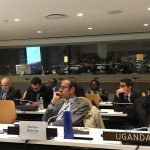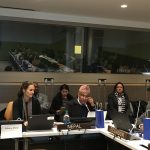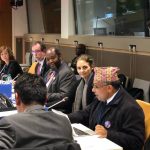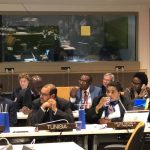The side event was chaired by Pali Lehohla, former Statistician-General of Statistics South Africa and Steering Committee member of the MPPN. Speakers included Directors of Statistics from Nepal, Philippines, Ecuador, South Africa, Tanzania, Mongolia, Uganda and Tunisia, with representatives also from Colombia, Rwanda and Egypt, as well as UNDP´s Human Development Report Office, UN´s Economic Commission for Latin America and the Caribbean, UN´s Economic and Social Commission for Western Asia and OPHI.
The event’s presentations will be added soon.
Highlights of each speaker’s points include:
Pali Lehohla, former Statistician-General, South Africa and Steering Committee, MPPN
- “We have a real treat tonight – a burst of information on how multidimensional poverty measures are being designed, disaggregated, and used in action to break the silos of poverty. For those of you who are here for the first time, you will leave here with a briefing on methodology and a map of exciting innovations in many countries.”
- “Multidimensional poverty is proving to give voice because it says ‘this is who we are, this is where we are, and this is how we are.’ So it gives voice to the poor and leaves no one behind.”
- “From observation, to monitoring, to planning, this is the challenge, I think, that we have to look at: What is the arsenal of tools that we can apply through multidimensional poverty into the planning processes?”
James Foster, Research Associate, OPHI and Oliver T Carr Professor, George Washington University
- “Why MPI has a very straight answer: poverty itself contains multiple forms with many dimensions. Who says that? UN member countries say this via the SDG process.”
- “It’s not just how many people are deprived, but also what they are deprived in. The different dimensions have to be examined in conjunction.”
- “MPIs provide a headline measure, disaggregations, interlinkages, to inform policy action, to complement monetary measures, to help leave no one behind.”
Full presentation is available here.
Suman Raj Aryal, Director General, Central Bureau of Statistics, Nepal
- “I think Nepal is one of the youngest countries to prepare an official National Multidimensional Poverty Index. We released our first figures a few months ago.”
- “There are fundamentally five motivations for Nepal to make a multidimensional poverty index: the first is to view the poverty through the different dimensions; the second is to assess the short-term effect of public interventions; the third is to understand the remittance effect; the fourth is to get an idea of the inter-sectoral linkages; the last one is, of course, to align with the SDG framework.”
- “Nepal decided to use the Global MPI as our National MPI with minor adjustments – that way we can compare with others, and also look within our seven new provinces”
Lisa Grace Bersales, National Statistician, Philippine Statistics Authority, Philippines
- “Poverty statistics are the most controversial official statistic we produce, so we really seek the guidance of this inter-agency committee, who are statisticians and economists.”
- “In the Philippines, poverty is a contentious issue, so we had to get the inputs from various groups, especially our national anti-poverty commission and also civil society, which had very strong ideas about which dimensions should be covered.”
Reinaldo Cervantes, Executive Director, National Institute of Statistics, Ecuador
- “In Ecuador, we are considering a new measure of poverty corresponding to our constitution…. our constitution mentions that the rights of people must be covered in multiple dimensions – education, health, employment, social security, habitat conditions, access to safe water, and others.”
- “Since the year 2017, we have two specific goals for multidimensional poverty reduction in our National Plan: first, reduce the multidimensional poverty rate from 35% to 27%; and second, reduce from 60% to 49% the multidimensional poverty rate in the rural areas.”
Risenga Maluleke, Statistician General, Statistics South Africa, South Africa
- “Between 2011 and 2016, poverty trends have diverged a lot more among municipalities.”
- “SAMPI helps to evaluate the effectiveness of poverty reduction, and, of course, it indicates the contributions of government social programs.”
- “We want to update the levels of disaggregation and use the SAMPI in policymaking.”
- “We are agreeing that we will come to meet in South Africa in October 2018 for the next MPPN Annual Meeting.”
Albina Chuwa, Director General, National Bureau of Statistics, Tanzania
- “We have been using the Global MPI in Tanzania for our national human development reports.”
- “Currently we are conducting our household budget survey, and now we want to establish our National MPI. We have engaged as many stakeholders as possible, including our development partners group.”
- “We are eager to join the group [of countries with National MPIs] and to see all these types of dimensions presented here.”
Ariunzaya Ayush, Chairperson, National Statistics Office, Mongolia
- “In Mongolia, we don’t have the official survey yet, but we have done a pilot survey.”
- “The outcome was quite high. When the income-based poverty measure was released in 2016, it was 29%, almost 30%. In the multidimensional poverty measure, the rate of deprivations for health was 42%, housing dimension was almost 60%, and standard of living was 40%.
- “Some of the selected indicators cannot express Mongolian conditions, maybe, and that could be the reason for the high MPI [relative to the income-based poverty measure]. Therefore, we understand that we need to organize more discussions with the related ministries and, of course, a multi-stakeholder group at the policy level.”
Full presentation is available here.
Ben Paul Mungyereza, Executive Director, Bureau of Statistics, Uganda
- “We have not started producing the MPI, but we have done the groundwork for producing the MPI. So far, we have created a Core Technical Team and a Community of Practice. The core technical team reports to the Ministry of Finance and it has members from the national statistics office, the planning authority, and the Economic Policy Research Centre. The core technical team is responsible for reviewing and computing the MPI, while the Community of Practice is mandated to engage the stakeholders and increase awareness among the stakeholders.”
- “The consultations we have had so far, the outcome is informing the dimensions and indicators that we need to address. And the areas that are clearly coming out that need to be addressed by the MPI: accountability, powerlessness, vulnerability, agriculture, housing, and education.”
Hedi Saidi, Director General, National Institute of Statistics, Tunisia
- “In Tunisia, we have developed, in coordination with OPHI and UNDP, a National MPI.”
- “Our MPI provides a strong tool to inform, monitor, and evaluate progress towards priorities that include employment, alongside living standards, health, and education. We incorporate these priorities into our Development Plan 2017-2020, and the MPI is designed to monitor it.”
- “The MPI tool will be used to monitor, evaluate, and adjust the National Plan and its related social economic programs by targeting the most important vulnerable populations in an efficient way.”
Full presentation is available here.
Carlos Felipe Prada, Deputy Director, Administrative Department of National Statistics (DANE) Colombia
- “The numbers of poverty in Colombia have been decreasing. We are working and thinking, because we have some indicators that are close to 100%… So, we are trying to have a new index in a couple of years.”
- “In Colombia we have an expert committee on poverty and multidimensional measurement that includes academics and some other government institutions and receives comments from civil society.”
- “We want to have the MPI disaggregated at the lowest municipality. With this census, with the national household surveys in Colombia, we can have the MPI measure for each municipality in Colombia and each village in the rural areas of Colombia. For us, it is a tremendous advantage and a tremendous improvement in our measurement because we want the MPI measure to have results for each department in Colombia.”
Full presentation is available here.
Ivan Murenzi, Deputy Director, National Institute of Statistics, Rwanda
- “Rwanda is a very small, developing country, but with great ambitions. And poverty is definitely one of the key, key issues that the leadership is committed to tackle.”
- “For our recent results, which we hope to release sometime in August or September, we will be disseminating results of monetary poverty as well as multidimensional poverty. So, one key issue I had in my mind is how do we package this together?”
- “In Rwanda, we usually have an annual leadership retreat, which brings together all government leaders. And it was amazing to see from some of the discussions we had through the Ministry of Finance, Ministry of Health, how this multidimensional assessment of poverty begins to bring everyone on board when we talk of poverty. Previously, in my view, monetary poverty has been more seen as an issue for the Ministries of Finance and Planning, but what multidimensional poverty is doing is bringing all the other stakeholders, from all corners, together.”
Heba Saied, Statistician, Central Agency for Public Mobilization and Statistics, Egypt
- “Poverty is not only monetary metrics, but there is a global trend to define poverty as the lack of access to services or deprivations in other aspects of life.”
- “Why do we use the HEICS [Household Expenditure and Income Survey] for our MPI? The HEICS provided non-monetary data about many indicators that are useful for multidimensional poverty measurement, as well as household expenditure and consumption. Also, the period of the survey is every two years, which allows for continuous monitoring of the conditions of the poor.”
Full presentation is available here.
Selim Jahan, Director, Human Development Report Office, UNDP
- “There is no need to emphasize once again that poverty is multidimensional. We all know that. But, at the same time we need a measure for that multidimensional poverty because often it is said that what we cannot count, is not counted.”
- “We started the journey on the Multidimensional Poverty Index, or MPI, back in 2010. When HDRO and OPHI started that journey through collaboration and worked over the years to publish and disseminate the results in the HDRs. Over the years, there have been some differences in methodologies, and there was the HDRO methodology and the OPHI methodology, but over the last year, Sabina and I and both our teams have discussed it over and over and found out that the differences were minimal and trivial, in some cases, if I may say so. Therefore, we have now decided to have one Global MPI methodology.”
- “As in the movie Casablanca, the last line was ‘Louie, this is the beginning of a longstanding friendship,’ and, with that I say that with OPHI and HDRO, this is also the beginning of a longstanding friendship, the results of which will be reflected in new generations of the HDRs.”
Pascual Gerstenfeld, Director, Statistics Division, UN-ECLAC
- “We are close to 60 persons, at this time, in New York, in a storm, talking about how to measure poverty.”
- “In 33 years, this [the MPPN] is the strongest network I have been involved in… When we began in 2013, there were fewer than 20 countries and five institutions, but now we are 53 countries and 15 institutions in less than five years. This is a real network. The word ‘Network’ is very strong and really, really important.”
- “We are working together now in four of the five regional commissions – ESCWA, ECA, ESCAP, and ECLAC – on a study of availability, comparability, and quality of indicators for monitoring goals 1.2 and 1.4.”
Marwan Khawaja, Chief, Demographic & Social Statistics, UN-ESCWA
- “The Arab Multidimensional Poverty Report was released a few months ago, at the end of 2017… The main goal was to develop an MPI tailored to middle-income countries, which a majority of Arab countries are.”
- “We wanted this MPI to serve as a foundation for developing a poverty reduction strategy.”
- “The report was produced with the League of Arab States, and that implies that the member states of the League had to endorse the report.
Sabina Alkire, Director, OPHI
- “Many countries have launched their MPIs as an official permanent statistic of poverty that goes along with the monetary poverty measure. That has to go through a number of internal processes, so it becomes an official statistic – and one that is used by policy at the highest level to drive action and reduce disadvantages effectively.”
- “Besides statistical reports, Voluntary National Reviews and the High Level Political Forum are places countries are sharing how the MPI can be used for policy.”
- “Many countries are wanting to report their MPI for SDG indicator 1.2.2.”
- “The MPPN [Multidimensional Poverty Peer Network] is a South-South network that was launched in Oxford by Amartya Sen, Nobel Laureate in Economics, and President Santos of Colombia, that tries to have both statisticians and policymakers share their experiences in developing an MPI. You are all welcome to join and share your insights with us on how best to fight poverty in all its dimensions.”
Full presentation is available here.
Photo gallery:
Click on the image to enlarge




















Recent Comments